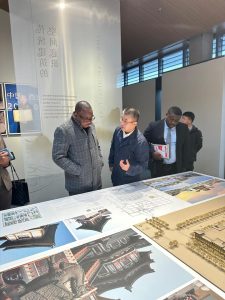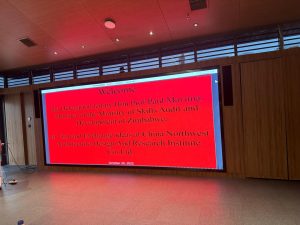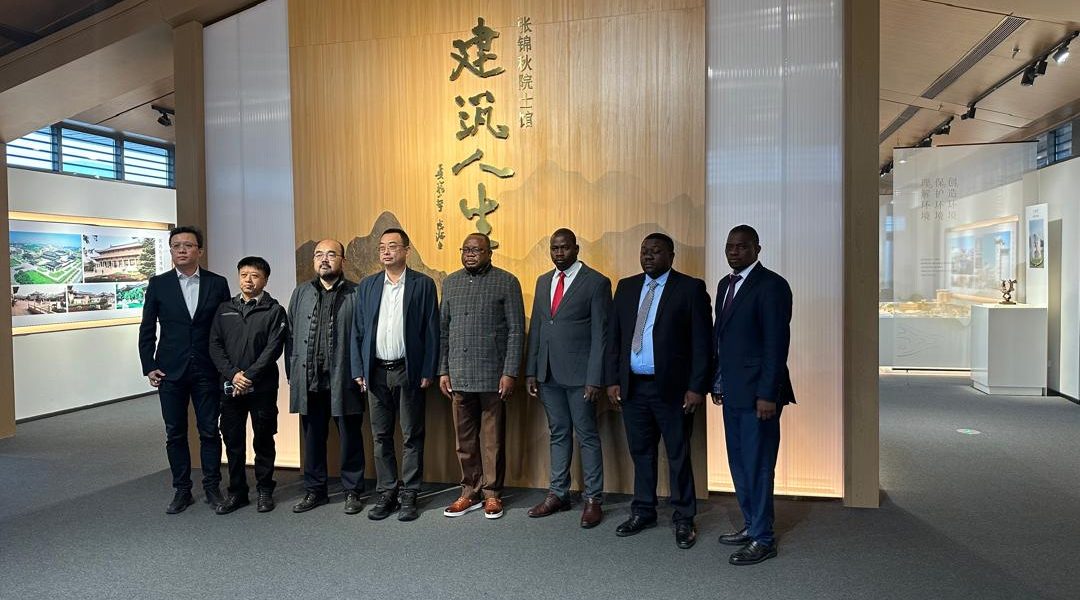XIAN, CHINA – Professor Paul Mavima, Minister of Skills Audit and Development, is leading a Zimbabwean delegation to the China Northwest Architecture Design and Research Institute Co. Ltd in Xian, where he was warmly received to discuss groundbreaking cooperation initiatives in skills development for high-end architectural design, civil engineering and project planning and management.
The Minister, accompanied by officials from Xian Technological University, engaged in comprehensive discussions aimed at establishing strategic partnerships that will enhance Zimbabwe’s capacity in sophisticated architectural design, advanced civil engineering techniques and modern project management methodologies. The visit represents a significant step in Zimbabwe’s efforts to build world-class expertise in the built environment sector, which is critical for the country’s industrialisation and infrastructure development agenda under Vision 2030.
 China Northwest Architecture Design and Research Institute Co. Ltd, is one of China’s leading architectural and engineering firms with decades of experience in complex infrastructure projects across Asia, Africa and beyond. The proposed cooperation will focus on equipping Zimbabwean professionals and students with skills in sustainable architecture, smart building technologies, mega-project management and innovative engineering solutions that address contemporary urban and infrastructure challenges.
China Northwest Architecture Design and Research Institute Co. Ltd, is one of China’s leading architectural and engineering firms with decades of experience in complex infrastructure projects across Asia, Africa and beyond. The proposed cooperation will focus on equipping Zimbabwean professionals and students with skills in sustainable architecture, smart building technologies, mega-project management and innovative engineering solutions that address contemporary urban and infrastructure challenges.
The partnership discussions also explored opportunities for staff exchanges, joint training programmes, student attachments, collaborative research initiatives and the establishment of centres of excellence in architectural and engineering education within Zimbabwe. Such cooperation aligns with the Ministry of Skills Audit and Development’s mandate to identify and develop skills that drive economic transformation, particularly in sectors critical for national development such as infrastructure, housing and urban planning.
Professor Mavima emphasised that Zimbabwe’s ambitious infrastructure development projects, urban renewal initiatives and industrialisation drive require a pipeline of highly skilled architects, engineers and project managers capable of delivering world-class results. “This partnership with China Northwest Architecture Design and Research Institute represents our commitment to ensuring that Zimbabwean professionals possess internationally competitive skills in architectural design and civil engineering. We are learning from China’s remarkable infrastructure achievements and seeking to adapt those lessons to our own development context,” the Minister stated.
The engagement with Xian Technological University further strengthened the cooperation framework, with discussions focusing on academic exchanges, curriculum development support and potential twinning arrangements between Zimbabwean and Chinese institutions offering programmes in architecture, civil engineering and construction management. Such institutional linkages will provide Zimbabwean students access to advanced learning facilities, exposure to global best practices and opportunities to gain practical experience in one of the world’s most dynamic construction and infrastructure sectors.

This mission to China forms part of the Ministry’s broader strategy to forge international partnerships that enhance Zimbabwe’s skills base in priority sectors identified through the National Skills Audit. The built environment sector, encompassing architecture, engineering, construction and urban planning, has been identified as critical for achieving the country’s development objectives, including affordable housing delivery, smart cities development and sustainable infrastructure provision.
The outcomes of this visit will inform the development of specialised training programmes, establishment of skills transfer mechanisms and creation of pathways for Zimbabwean professionals to gain advanced qualifications and practical experience in high-end architectural and engineering practices. The Ministry anticipates that this cooperation will not only enhance individual professional capabilities but also strengthen Zimbabwe’s institutional capacity to plan, design and execute complex infrastructure projects that meet international standards.


